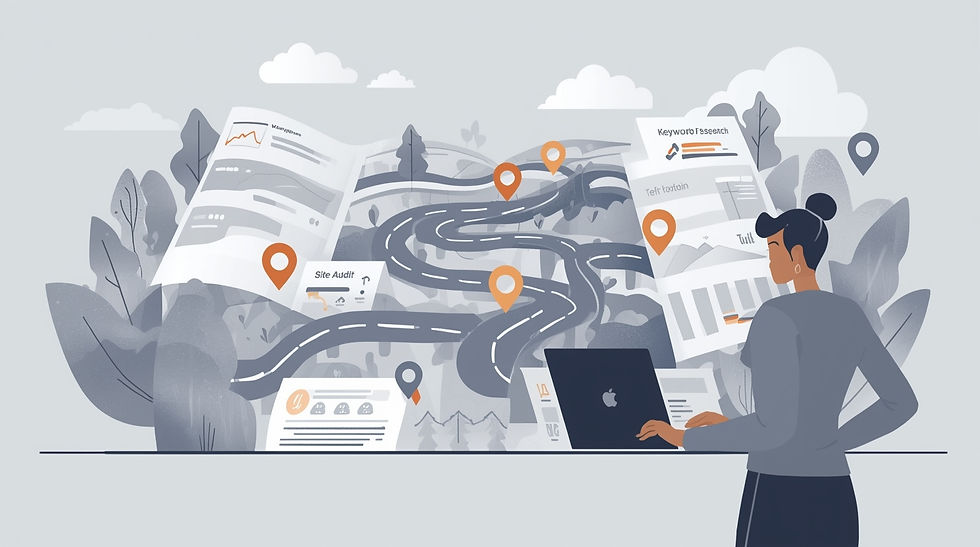Blogging Communities & Collaboration: A 2025 Guide
- Elisha Bearam

- Sep 23
- 9 min read
Disclosure: I may earn a small commission for purchases made through affiliate links in this post at no extra cost to you. I only recommend products I truly believe in. Thank you for supporting my site!

You’ve set up your blog. You’re creating content you’re proud of. But as you stare at your analytics, that feeling creeps in: isolation. Blogging can be a lonely journey when you’re trying to figure it all out by yourself.
What if the secret to faster growth isn’t just another technical SEO trick, but something much more human?
The truth is, the most successful bloggers don’t operate in a vacuum. They are part of a ecosystem of support, a network of peers who provide encouragement, knowledge, and opportunities.
This guide is all about the power of blogging communities and collaboration. We’ll walk you through how to find your people, become a valued community member, and leverage partnerships to boost your traffic and income.
It’s time to stop going it alone and start growing together.
What Are Blogging Communities & Collaboration?
Let’s start with the basics. A blogging community is simply a group of like-minded creators who support each other.
Think of it as your professional support group. Collaboration is the natural next step: it’s the act of working together with other bloggers on shared goals.
These connections can take many forms:
Online Forums and Facebook Groups: These are the digital water coolers where bloggers ask questions, share wins, and offer advice.
Slack or Discord Channels: Often more focused and real-time, these are great for niche-specific discussions.
Mastermind Groups: A small, intimate circle of 3-5 bloggers who meet regularly to set goals, offer deep accountability, and solve tough problems.
Informal Partnerships: The one-on-one relationships you build that lead to sharing each other’s work or brainstorming ideas.
At its heart, it’s about moving from a solo mission to a team sport.
The Top 5 Benefits of Joining a Blogging Community

Why should you invest your precious time in building these connections? The returns are significant.
1. Combat Isolation and Find Your Tribe
Blogging from your kitchen table can feel isolating. A community instantly gives you a group of people who "get it."
They understand the frustration of a plugin breaking, the joy of your first affiliate sale, and the challenge of finding new topics.
This emotional support is invaluable for preventing burnout and keeping you motivated.
2. Accelerate Your Learning Curve
Instead of spending hours Googling a problem, you can get a vetted answer from someone who’s been there in minutes.
Communities are a goldmine of collective knowledge. You can learn from others’ mistakes and successes, gaining access to proven growth hacking strategies without having to test everything yourself.
3. Increase Your Blog's Visibility and Traffic
When you become a active member, people get to know and trust you. This naturally leads to shares of your content, mentions in round-up posts, and links from other sites.
It’s organic promotion that feels good because it’s built on genuine relationships.
4. Gain Accountability and Motivation
It’s easy to let your goals slide when you’re only accountable to yourself. Telling your mastermind group, "I will publish two posts this week," creates powerful external motivation.
Celebrating wins with others makes them even sweeter, and having a cheerleading squad during setbacks makes them easier to bear.
5. Unlock Collaboration Opportunities
This is where the magic happens. Blogging communities and collaboration go hand-in-hand. Within a community, you naturally discover bloggers with complementary skills and audiences.
These relationships are the fertile ground where collaborative projects like guest posts, webinars, and giveaways are born.
How to Find the Right Blogging Community for You
Not all groups are created equal. Finding the right fit is crucial for a positive experience.
Identify Your Niche and Goals
Before you start looking, get clear on what you need. Are you a food blogger? A personal finance writer? A sustainable lifestyle influencer?
Seek out communities specific to your niche. Also, consider your goal: are you looking for technical help, emotional support, or collaboration partners?
Your answers will guide your search.
Where to Look: Facebook Groups, Forums, and Platforms
Facebook Groups: Search for terms like "[Your Niche] Bloggers" or "Blogging for Beginners." These are often the most active and easy to find.
Blogging Forums: Platforms like Reddit have dedicated subreddits (e.g., r/Blogging) with vast knowledge bases.
Other Platforms: Don’t overlook the community potential of Quora. By answering questions in your niche, you can connect with both readers and fellow experts. Our guide on using Quora explains this strategy in detail.
Red Flags: How to Spot a Low-Value or Toxic Group
A bad community can waste your time and energy. Watch out for these warning signs:
Constant Self-Promotion: If the only posts are "Look at my new article!" with zero engagement, it’s a link dump, not a community.
Negative Atmosphere: If members are frequently complaining without seeking solutions or are dismissive of others, the culture is likely toxic.
Inactive Moderators: A good group needs active moderators to enforce rules and foster quality discussion.
The Art of Being a Valuable Community Member (Before Asking for Anything)

The key to benefiting from a community is to provide value first. Approach with a mindset of generosity.
The "Give First" Mindset
Walk in with the intention of being a helper, not a taker. Spend your first few weeks just listening and answering questions you know the answer to.
This builds goodwill and establishes you as a knowledgeable and supportive member.
How to Provide Genuine Help and Feedback
When someone asks a question, give a thoughtful, thorough answer. If you share someone’s content, add a sentence about why you found it valuable.
Instead of just saying "Great post!" try, "I loved your point about X, it solved a problem I was having with Y." Specificity shows you genuinely engaged with their work.
Engaging Consistently Without Burning Out
You don’t need to live in the group. Schedule 15-20 minutes a day, or a solid hour once a week, to catch up and engage meaningfully. Quality of interaction always trumps quantity.
Powerful Blog Collaboration Ideas to Try
Once you’ve built relationships, it’s time to collaborate. Here are some proven ideas.
Guest Posting: Writing for Each Other's Blogs
This is a classic for a reason. You write a high-quality article for another blog in your niche, and in return, you get a bio with a link back to your site.
It exposes you to a new, relevant audience and builds your authority. The key is to pitch a topic that is perfect for their readers, not just a rehash of your own content.
Round-Up Posts: Gathering Expert Insights
Choose a topic like "The Best Budgeting Tips from 20 Finance Experts" or "Top 10 Time-Saving Kitchen Hacks from Food Bloggers."
Reach out to bloggers you admire and ask for their brief tip.
Everyone gets exposure to each other’s audiences, and you create a resource packed with value that is highly shareable.
Collaborative Giveaways and Bundles
Team up with 3-4 other bloggers to offer a mega-giveaway. For example, a "Self-Care Bundle" could include a blogger who sells candles, one who offers printable planners, and another with a course on meditation.
Everyone promotes the giveaway, exponentially increasing its reach and helping you all gain new email subscribers.
Joint Webinars or Live Events
Partner with a blogger who has a complementary skill set. If you’re a recipe developer, partner with a food photographer for a webinar on "Shooting iPhone Photos That Make Food Look Irresistible."
You cross-promote to both your email lists, providing huge value and solidifying your expert status.
This is also a powerful stepping stone to securing sponsored collaborations down the line.
How to Approach Other Bloggers for Collaboration
Feeling nervous about reaching out? A thoughtful approach makes all the difference.
Crafting a Professional and Personal Pitch
Avoid generic, copy-pasted messages. Your pitch should show you’re familiar with their work.
Personalize It: Start by mentioning a specific article of theirs you enjoyed and why.
Be Clear and Concise: Clearly state your collaboration idea and why you think it’s a good fit for both your audiences.
Make It Easy: Propose a next step, like "Would you be open to a quick 15-minute chat to discuss this further?"
What to Offer: Making It a Win-Win
Always lead with what’s in it for them. If you have a smaller audience, you can offer your skills instead. For example, "I admire your blog and have a knack for graphic design.
I’d be happy to create a set of Pinterest pins for your latest post in exchange for a guest post opportunity." Focus on creating mutual value.
Following Up (Without Being Annoying)
People are busy. If you don’t hear back in a week, it’s appropriate to send a single, polite follow-up email. Something like, "Just wanted to gently bump this in case it got lost in your inbox!"
If you still don’t hear back, let it go and move on. No response is a response.
Starting Your Own Mastermind Group for Maximum Growth

For the highest level of support, consider creating a mastermind group.
Defining the Purpose and Structure
A mastermind is a small, private group that meets regularly (e.g., monthly) to act as a board of advisors for each other.
Decide the focus: is it for accountability, business strategy, or technical SEO? Set a meeting frequency and a rough agenda to keep things structured.
How to Find the Right 3-5 People
Look for bloggers who are at a similar or slightly more advanced stage than you. You want people who are committed and serious.
Great places to find members include niche-specific communities or even by reaching out to bloggers you’ve connected with on social media.
You might find passionate individuals in communities focused on writing side hustles or other creative fields.
Setting Agendas and Maintaining Momentum
To avoid meetings turning into chat sessions, have a loose agenda. Each member can share a win, a challenge, and their goals for the next month.
The group then offers suggestions and accountability. This structure ensures everyone gets value and the group stays productive long-term.
Essential Tools for Managing Community and Collaboration
A few simple tools can make collaboration seamless.
Communication Tools (Slack, Voxer)
Project Management Tools (Trello, Asana)
For larger collaborations like creating a digital product or running a webinar, use a tool like Trello or Asana to assign tasks, set deadlines, and track progress.
This keeps everyone on the same page.
Scheduling Tools (Calendly)
Eliminate the back-and-forth of "when are you free?" Use Calendly to share your availability and let collaborators book time directly into your calendar.
Common Mistakes to Avoid in Community and Collaboration

A few missteps can undermine your efforts. Steer clear of these.
Being Too Promotional, Too Soon
Jumping into a new group and immediately dropping your link is the fastest way to get ignored (or removed). Remember the "give first" rule. Build trust before you promote.
Failing to Follow Through on Commitments
Your reputation is everything. If you agree to participate in a round-up post or publish a guest post by a certain date, meet your deadline. Flakiness will quickly close doors to future opportunities.
This is one of the most common common blogging mistakes that can hinder growth, and a good community helps you stay accountable to avoid it.
Spreading Yourself Too Thin Across Too Many Groups
It’s better to be an active, valuable member of one or two communities than a ghost in ten. Focus your energy where you get the most value and can contribute the most.
Frequently Asked Questions (FAQ)
Are paid blogging communities worth it?
It depends. Paid communities often have more engaged members, better moderation, and exclusive resources.
If the community is highly specific to your niche and run by a trusted expert, the investment can be worthwhile. Always look for reviews or a free trial first.
How do I collaborate if I'm a new blogger with a small audience?
Lead with your skills, not your audience size. Offer your expertise in writing, graphic design, Pinterest management, or video editing.
Propose a guest post and promise to heavily promote it to your (however small) network. Everyone starts somewhere, and most established bloggers remember being beginners.
What's the difference between a Facebook Group and a mastermind?
A Facebook Group is a large, general community for broad support and networking. A mastermind is a small, private, and highly focused group for deep accountability and strategic advice.
It’s the difference between a large networking event and a private meeting with your closest advisors.
How much time should I invest in community engagement?
Start with 30-60 minutes, 2-3 times per week. Consistency is more important than spending hours in one sitting. Schedule it like any other important task.
Conclusion: Your Next Step to Collaborative Growth
Blogging communities and collaboration are not just nice-to-haves; they are essential strategies for sustainable growth.
They provide the support system, knowledge, and opportunities that can cut years off your learning curve and amplify your reach.
You don’t have to build your blog alone. Your success is deeply connected to the people you choose to connect with.
This week, choose one single action. It could be researching and joining one new, high-quality blogging Facebook Group.
Or, it could be identifying one blogger you genuinely admire and leaving a thoughtful comment on their latest post.
Take that first small step toward finding your tribe. Your future blog—and your sanity—will thank you for it.



Comments